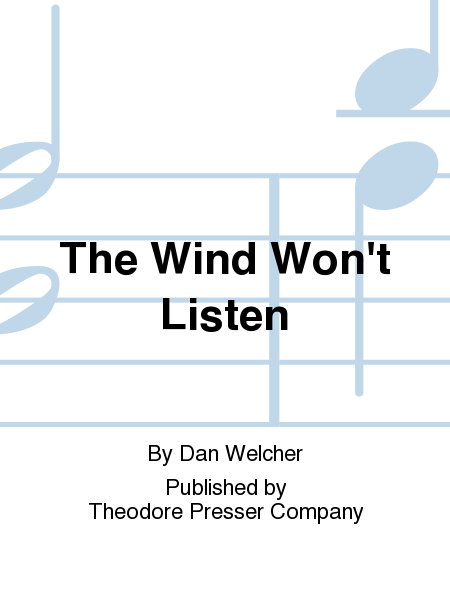The Wind Won't Listen
-
Ships in 2 to 3 weeks
Details
Description
SKU: PR.16400261S
Composed by Dan Welcher. With Standard notation. Duration 15 minutes. Theodore Presser Company #164-00261S. Published by Theodore Presser Company (PR.16400261S).UPC: 680160038411.
Since the bassoon is my own instrument, many people have asked me why I've written so little for the instrument. Beyond my early Concerto Da Camera for bassoon and small orchestra, written for Leonard Sharrow in 1975, I've not written a single piece that features the bassoon as a solo vehicle (though I have written three woodwind quintets). When I first began composing seriously, critics were quick to point out that my orchestral writing revealed nothing of my roots as a woodwind player--and bassoonists asked why my pieces didn't have more bassoon solos. Perhaps I was so aware that people were looking at me as a bassoonist/composer that I was determined to remove that stigma. Now that my transformation from performer to composer is complete, however, it's time to re-address my instrument. I wanted this new piece to be serious rather than whimsical. The Wind Won't Listen represents my return to the bassoon as the highly expressive, poetic soul that it is. As such, it shouldn't come as a surprise that the piece is based on a poem, and that the title of the piece as well as both its movement titles come from lines in that poem. I first read Beth Gylys' poem Split at the MacDowell Colony in the summer of 2001, and it made a big impression on me. My personal life had been ruptured by divorce in the preceding year. This poem, with its dry insistence on observation rather than feeling, expressed the wrung-out state of my emotions at the time better than any I had seen. I set it to music, as a song, immediately. In this format, for voice and piano, I was able to put a musical note to every word of the poem. The first lines of the poem, Everyone I know is crying, or should be crying, became a melody that haunted me even without the words. The work for bassoon and string quartet is an outgrowth of the song. The first movement is labeled Romanza, and has a loose formal arch structure of A-B-C-B-A, with B and C being fast sections framed by the lamenting A music. In addition to hearing the bassoon's first notes attached to the lines Everyone I know is crying, there's a sense of agitation, of loss, of longing, and at times of desperation in the music. At one point, the opening theme from Tristan even appears in the strings. The second movement follows, without a real pause--the pizzicato final chords of the first movement becoming the increasingly aggressive opening chords of the second. The recitative is actually a foreshadowing of the basic theme that will be varied, again to the words of the song: Life makes itself without us. Don't let me tell you how it is. Go out. Look. The recitative begins in an anguished state, but subsides into more gentle singing by the end, when it simply falls into an ostinato 5/8-3/4 pattern to begin the variations. Marked Very steady tempo; Dancing, this set of variations consists of three dances, each faster than the previous. The first, in the aforementioned 5/8-3/4 meter, gives way to a 3/8 scherzo, which in turn takes on a furious 2/4 scurrying motion. The music becomes breathless, almost pulse-less, and an ethereal theme appears in the violins while the rushing music continues, sotto voce in the bassoon. This new theme is also from the song: Why do I do this? The wind won't listen. The bassoon re-states its Everyone I know is crying melody from the first movement, and at length the 5/8-3/4 music returns, more subdued this time. The piece ends on a major-minor chord, suspended. The Wind Won't Listen is dedicated to the man who commissioned it, bassoonist Steven Dibner--who shares my passion for poetry and language. --Dan Welcher.

 Share
Share